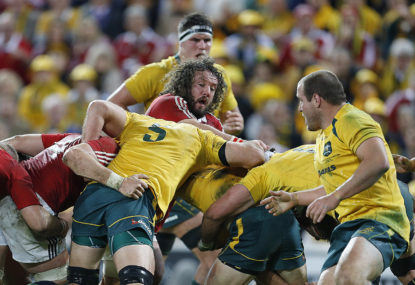When attempting to explain the allure of our game to non-believers, rugby tragics commonly cite two things. One, that it’s a game for all shapes and sizes. And two, that it provides constant contests for possession.
Which brings one to the scrum.
Once a humble restart, it became a mystery, a game within a game, the “dark arts”, and more simply, a means to show physical superiority. But now, it is more than that. It is a means to an end.
Conquer the opposition scrum, win a penalty, kick 3 points. Repeat. Repeat again. And again. Win the game. Simple.
Captivating, perhaps, to a select few, but not exactly riveting viewing for the rest of us who like to see those things called tries. You know, those things which were once the object of the game.
So how has this all been allowed to evolve?
Well, a couple of years ago, scrum resets were at an all time high. Precious game time was lost, and spectators voted with their feet. So, referees were instructed to “find fault”, penalise accordingly, and get on with it.
Sure, like any other part of the game, the scrum has it’s laws which need to be used in cases of illegal play, or when a team attempts to gain an unfair advantage.
That’s fine.
But why is the scrum the only part of the game which rewards dominance with a penalty kick? Or put another way, why sanction a technically inferior team with a penalty kick simply because they are not good enough? Think about it.
Dominance in midfield or out wide results in line breaks, field position, and ultimately, tries. Dominance at tackle will allow you to retain possession, or win a turnover. Dominance at lineout will offer similar reward.
So, rewarding scrum dominance or sanctioning inferiority with a penalty kick is quite an anomaly, and demonstrably inconsistent. It is a disproportionate reward. Scrum dominance should only be rewarded with field position and/or possession.
At the moment, a scrum which gets smashed is invariably penalised, even if they do not intentionally infringe the law. If they do deliberately infringe, of course they should be liable to penalty.
So here’s a suggestion.
A team with a dominant scrum, on their own feed, will move it forward, and be able to provide stable possession for their team. And on the opposition feed, they will disrupt the opposition’s ball, and perhaps send them backwards. This alone is reward for dominance, as most Rugby people know, since invariably backs cannot create much from poor quality ball, or if their pack is going backwards.
If they cause the weaker scrum to disintegrate with the ball unplayable, why not be rewarded with a scrum feed turnover, as already exists with scrums which rotate through 90 degrees, and similarly “use it or lose it” at a maul?
Or, God forbid, earn a free kick!
Ok, for those from the North thinking this is just another Aussie attempt to de-power scrums, it’s anything but. Put in the context of the Third Test last Saturday, imagine the same scenario. Let’s assume most of Romain Poite’s penalties against Australia were correct (which they were).
Under this proposal, The Lions, instead of kicking 3 points, would have gone deep into Australian territory. Fans saw what their backs could do in the second half, so it’s not unreasonable to suggest a greater winning margin.
If they go down this path or something similar, there would be fewer scrum penalties, the referee’s role would be greatly diminished, matches would not be decided on penalty kicks from scrums, dominance in scrums would be consistent with dominance in other areas, and the point of difference Rugby has over other codes, would be retained.
Who knows, a greater incentive to score tries might even get the crowds back!





























































































